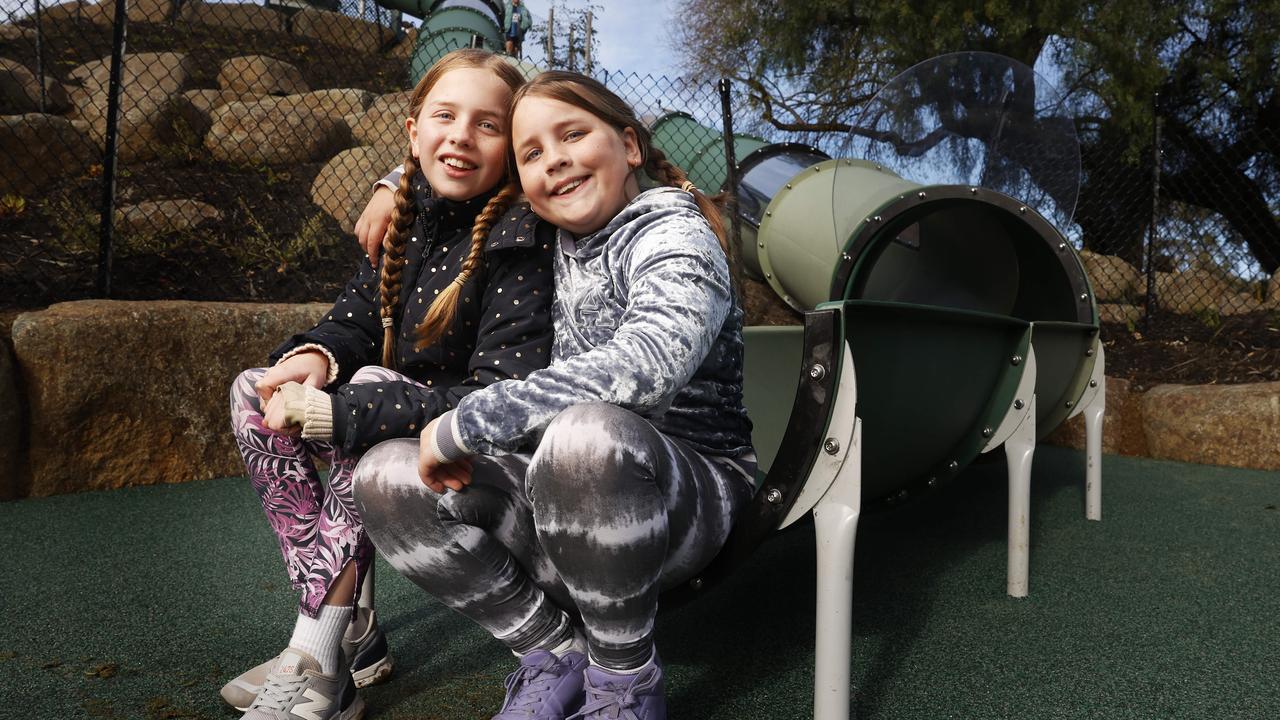‘They’ve lost already’: Former premier David Bartlett’s warning for fish farm industry
The fish farming industry is taking the same “ham-fisted, boofheaded approach” as the forestry industry and the end results will be the same, a former premier has warned
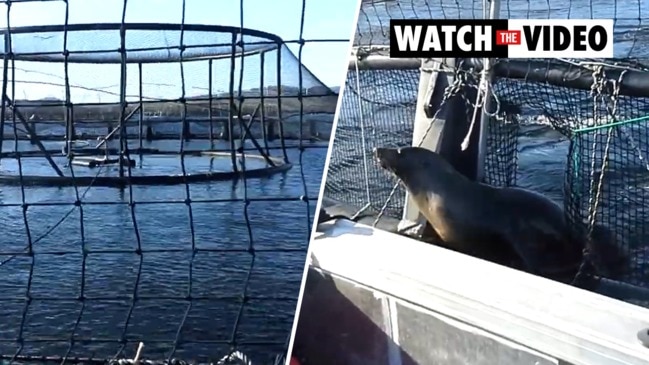
Tasmania
Don't miss out on the headlines from Tasmania. Followed categories will be added to My News.
THE salmon industry is making the same mistakes as forestry did before it — and will suffer the same fate, former Labor premier David Bartlett says.
His comments came as an opinion poll showed strong community concern with the expansion of fish farms.
A uComms telephone poll of 1023 Tasmania voters commissioned by the Australia Institute revealed 63 per cent of respondents were concerned the health of the state’s coastal waters is declining and 56 per cent agreed that the state government wasn’t doing enough to protect the health of the ocean.
The poll was taken the day of the release of a highly critical book Toxic by Tasmanian author Richard Flanagan.
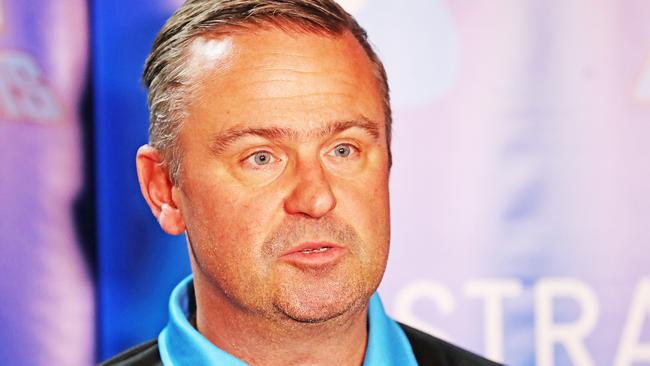
Mr Bartlett told the Mercury he did not have an opinion about the rights and wrongs of the debate, but said he could see already how it would end.
“The salmon industry have already lost this debate. History is repeating itself. It is over already,” he wrote in a series of tweets.
“They are taking the same ham-fisted, boofheaded approach that Hydro took in the eighties, and Forestry/Gunns took in the nineties-noughties.
“The opponents are taking a well structured, well-crafted approach. We know how this ends.
“The Minister refusing to go into the media. The industry body refusing to talk to the media. The companies taking a f-you approach.
“They’ve lost already. The debate may rage for another 20 years but they have lost already.”
To be clear from the outset, I’m not making my personal views about the salmon industry known in this tweet. But, the salmon industry have already lost this debate. History is repeating itself. It is over already. 1/3 #politas
— David Bartlett (@Bartlett_DJ) April 22, 2021
The Australia Institute poll also showed 63 per cent of respondents supported a halt to the expansion of salmon farms until current inquiries and reviews are complete.
The director of the Australia Institute Tasmania Eloise Carr said the poll showed people were looking to government for greater leadership on the issue.
“There is clear appetite from Tasmanians for more government action on the health of our oceans, in fact our research shows most Tasmanians think the government isn’t doing enough to protect the health of our ocean,” she said.
“Without a more comprehensive approach, Tasmanian industries which rely on a healthy ocean will begin to suffer and Tasmania’s economic interests as a whole will suffer in the short to medium term.”
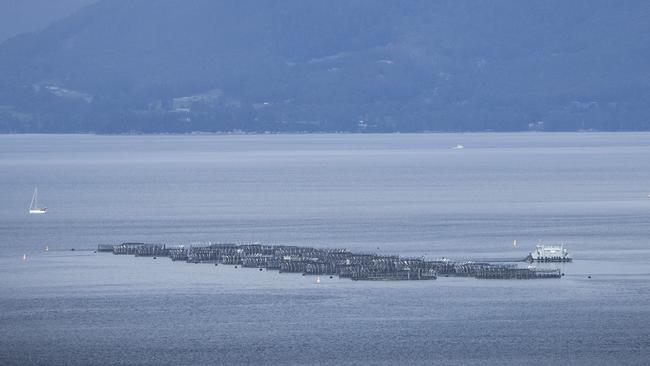
Greens MP Rosalie Woodruff said Mr Bartlett was right and the industry needed to act fast to survive.
“The only way out of this mess is for the Labor and Liberal parties to support the science, to listen to the scientists and to come on board with moving the salmon industry in Tasmania on land to closed loop systems,” she said.
“It’s entirely up to the salmon industry how it chooses to respond and it is entirely up to the Labor and Liberal parties to listen to the scientists, to understand why that book was written.
“It was written in a cry of anger and defiance.”
Bruny elite vow to rage against fish farms
THE state’s environment movement has flagged a global campaign to tell consumers the “shocking truth” about Tasmanian-grown Atlantic salmon.
A coalition of environment, fishing, boating and political groups believe Richard Flanagan’s new book Toxic, on the state’s aquaculture industry, is a chance to reform the industry.
Laura Kelly from Environment Tasmania says the way the state’s aquaculture industry is being run is damaging the state’s brand.
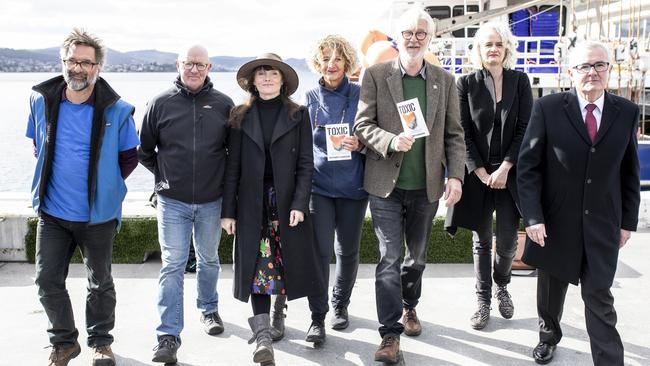
“Environment Tasmania will be massively ramping up our consumer marketing campaign off the back of this work,” she said.
“We regularly speak with celebrity chefs that influence the wholesale market. They are all absolutely shocked to hear about the impacts of feedlot salmon farms on Tasmania.”
Actor Essie Davis said the Bruny Island community had been tormented by expanding fish farms – which she called “bad neighbours”.
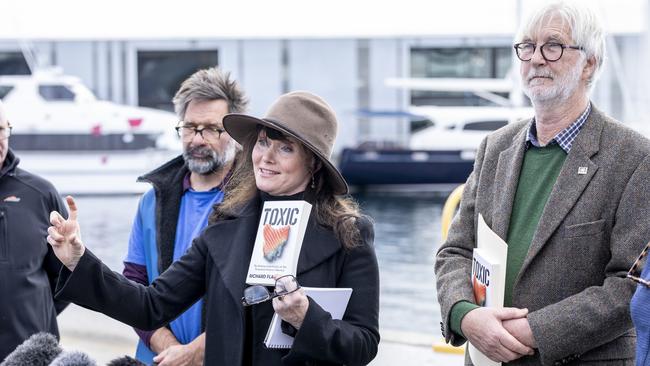
“When I take my children down to the Channel to swim and fossick and fish and snorkel, there is nothing there. There is no kelp. There is no abalone. There are no weedy sea dragons. There are no leather jackets. There are no fish. There’s just a lot of sea lettuce and slime.”
Peter George from the Tasmanian Alliance for Marine Protection said there was talk of a plan to massively expand fish pens into new areas, but it had not been mentioned during the election campaign.
Federal MP Andrew Wilkie said moving fish farms onshore was the key to fixing many of the problems.
And Greens MP Rosalie Woodruff said the major parties were responsible for the current state of play and conflict.
‘An attack on local jobs’
THE union representing salmon industry workers says a new book by author Richard Flanagan is an attack on thousands of local jobs which Tasmanians shouldn’t bother reading.
The Man Booker award winner’s new book Toxic takes on the state’s aquaculture industry, saying it has caused environmental destruction, ignored community outcry and has benefited from lax oversight from compliant governments.
But Australian Workers’ Union spokesman Robert Flanagan, who is no relation to the author, said the book was motivated by self-interest.
“I’m sorry Richard Flanagan felt upset when his beach house views were disturbed by workers doing something useful and productive for the Tasmanian economy, their families and regional communities,” he said.
“Tasmania is internationally recognised as having some of the highest salmon standards in the world.”
The industry – and the jobs it provides – would be of critical importance to the state’s economic future, he said.
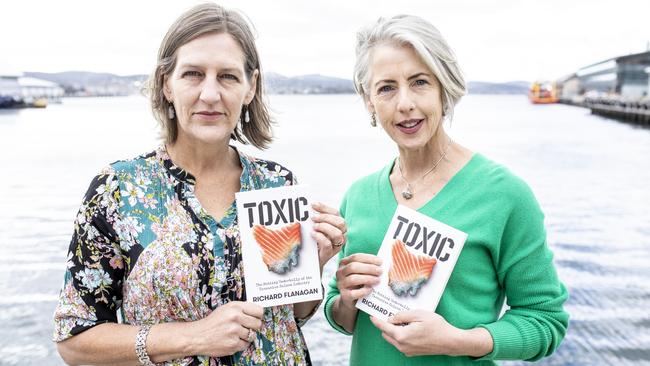
Tassal shares ended trading on Thursday at $3.88, up seven cents. Huon Aquaculture was unchanged at $2.60.
Premier Peter Gutwein rejected the premise of the book.
“I believe the industry is well regulated, in fact, we have significantly strengthened the regulation, put in place an independent regulator which wasn’t in place before.
“It employs thousands of people in regional and rural areas especially.”
The Tasmanian Salmonid Growers Association said the industry was well-regulated and was of critical economic importance to the state.
“Our reach into the real Tasmania and local jobs is deep and the impact of this book will be deeply felt by the more than 2000 people we directly employ and their families, as well as thousands of contractors that are part of our industry.
“These allegations hit hardworking Tasmanians and the Tasmanian brand, all while the state is working to recover from COVID-19.”
Labor candidate for Franklin Dean Winter said his party was solidly behind workers.
“Labor supports the aquaculture industry 100 per cent. We support the aquaculture industry because it employs thousands of Tasmanians,” he said.
“It’s important to note that a lot of the people that are raising concerns do not live on Bruny Island or in Kingborough – they live elsewhere.”



